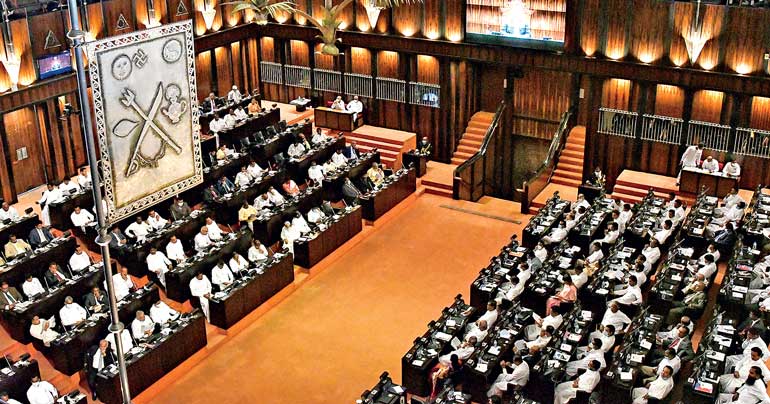Thursday Feb 05, 2026
Thursday Feb 05, 2026
Tuesday, 26 April 2022 03:04 - - {{hitsCtrl.values.hits}}

By Senany Dayaratne
All employees in the private and public sectors fear the swift termination of their services, in the event of egregious non-performance, misconduct or fraud. That eventuality is provided for in corporate disciplinary codes, in the case of the private sector, or in the Establishments Code and other statutory disciplinary codes, in the case of the public sector. This essential deterrent to dereliction of duty, in its many forms, is glaringly absent, in any meaningful or realistic way, in the case of our elected representatives.
It is an undeniable fact that many of our parliamentarians habitually engage in behaviour and conduct deserving of severe punitive sanctions, but instead of being held immediately accountable, they continue to sit in parliament and make laws, in the comfort that they only need to fear for their re-election, which would come to pass several years later, by which time everything would be forgotten by a citizenry distracted by the daily struggle to survive. Let us not forget that even a convicted murderer was recently allowed to sit in parliament and make laws. This is completely unacceptable in a democracy. There has to be a mechanism in any constitution founded on the Rule of Law, which provides for the recall of errant parliamentarians who have breached the public trust.
Recalling elected representatives is by no means unprecedented or unique. It has its origins in Athenian democracy, and the United States of America, Germany, Switzerland and Japan, for example, have such legal provisions currently in place, albeit mostly at a state, provincial or local government level.
I propose that a similar safeguard be included in the proposed new amendment to the Sri Lankan Constitution, to become operative with retrospective effect in respect of parliamentarians appointed to parliament in 2020.
The most efficacious and workable methodology could be discussed at greater length and refined, as needed, but, as a preliminary proposal on principle, I suggest the following.
Our parliamentarians are either elected by popular vote at a district level, or appointed from the National List.
In respect of the former, a district-based ‘Recall Referendum’ should be mandatorily triggered by a written petition subscribed to by no fewer than 3% of the total number of registered voters of that particular district, calling for the recall of a particular parliamentarian. Upon such petition being presented to the Elections Commission [EC], the EC would authenticate the same, as needed, and then conduct a Recall Referendum in the relevant district, where the question would be put to the registered voters of that district, as to whether that parliamentarian should be recalled or not. If 50% plus 1 of the votes cast [as opposed to 50% plus 1 of the total number of registered voters] are for a recall, the relevant parliamentarian would lose his seat in parliament, and the candidate with the next highest preferential votes from the relevant political party or group would mandatorily succeed to the vacant seat.
In the case of a parliamentarian appointed from the National List, the same process should be followed, and the district of the parliamentarian’s permanent residence (to be registered at the time of appointment to parliament) would be the applicable district for the conduct of the Recall Referendum. In the event of a recall being voted upon, the relevant political party or group would nominate a successor from their published National List. Whilst there may be a concern that this process would entail significant public expense, it is my considered view that, the intense additional scrutiny by the public, as well as the even greater scrutiny by persons next on the list, would result in parliamentarians taking great pains to keep their conduct in check, to ensure that this mechanism is never triggered, and thereby resulting in Recall Referenda being infrequent. It is not unrealistic to expect that a pro-citizen constitutional provision of this nature, would have the salutary consequence of parliamentarians losing their sense of impunity, and becoming far more conscious of public opinion and confidence.
In any event, from a good governance point of view, I do believe that the potential benefit is far greater than the potential expense, and that the public should exert strong popular pressure to ensure that this provision is included in the Constitution. If it becomes a reality, it may not be outside the realm of possibility to consider providing for a presidential recall referendum as well.
(The writer is an
Attorney-at-Law.)